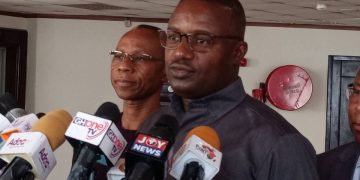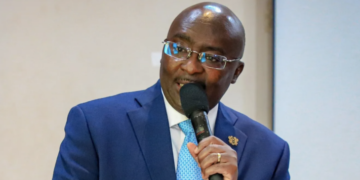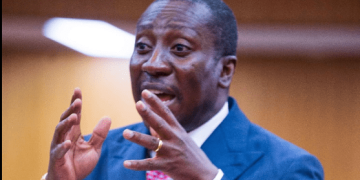Chinese President Xi Jinping should press Vladimir Putin to “halt the war crimes” in Ukraine, the US has urged.
The two will meet again on Tuesday for official talks during Mr Xi’s first visit to Moscow since the invasion.
The White House’s National Security Council spokesman called on Mr Xi to urge his Russian counterpart to withdraw troops from Ukraine.
John Kirby said seeking a ceasefire would not be enough.
“We hope that President Xi will press President Putin to cease bombing Ukrainian cities, hospitals and schools, to halt the war crimes and atrocities and to withdraw his troops,” he said.
“But we are concerned that instead China will reiterate calls for a ceasefire that leaves Russian forces inside Ukraine’s sovereign territory and any ceasefire that does not address the removal of Russian forces from Ukraine would effectively ratify Russia’s illegal conquests.”
In another development, Japan’s Prime Minister, Fumio Kishida, is making a surprise visit to Ukraine for talks with President Volodymyr Zelensky. He is expected to voice solidarity and support for Ukraine following Russia’s invasion.
Japan and China see each other as regional rivals. Since Russia’s war in Ukraine began, Tokyo has provided Kyiv with a mixture of humanitarian, financial and non-lethal military aid.
On Monday, Mr Xi and Mr Putin held more than four hours of what were described as informal talks, with more formal discussions scheduled for Tuesday.
There are concerns that China’s support for Russia – currently based on technology and trade – might become military, potentially including artillery shells.
Mr Putin has said he will discuss a 12-point plan proposed by Mr Xi to “settle the acute crisis in Ukraine”.
“We’re always open for a negotiation process,” Mr Putin said, as the leaders called each other “dear friend”.
China released its plan to end the war last month – it includes “ceasing hostilities” and resuming peace talks.
China’s plan did not specifically say that Russia must withdraw from Ukraine – which Ukraine has insisted as a precondition for any talks.
Instead, it talked of “respecting the sovereignty of all countries”, adding that “all parties must stay rational and exercise restraint” and “gradually de-escalate the situation”.
The plan also condemned the usage of “unilateral sanctions” – seen as a veiled criticism of Ukraine’s allies in the West.
On Monday, a military band gave Mr Xi a warm welcome to Moscow at the start of the three-day visit. Mr Putin hailed China for “observing the principles of justice” and pushing for “undivided security for every country”.
He added that China had made” a tremendous leap forward in its development” in recent years, remarking: “We even feel a bit envious.”
In return, Mr Xi told Mr Putin: “Under your strong leadership, Russia has made great strides in its prosperous development. I am confident that the Russian people will continue to give you their firm support.”
Before Mr Xi’s arrival, Mr Putin wrote in China’s People’s Daily newspaper that the two nations would not be weakened by “aggressive” US policy.
Ukrainian leaders have been publicly emphasising the common ground they have with China – respecting sovereignty and territorial integrity – but privately, they have been lobbying for a meeting or telephone call between President Volodymyr Zelensky and Mr Xi.
This was echoed by Mr Kirby, the US security spokesman, who urged Mr Xi “to play a constructive role” in the effort to end the conflict by speaking with Mr Zelensky.
Russia is a source of oil for Beijing’s huge economy, and is seen as a partner in standing up to the US.
Mr Xi’s visit to Moscow comes days after the International Criminal Court (ICC) issued an arrest warrant for the Russian president over war crime allegations. This means Mr Putin could technically be arrested in 123 countries – though neither China nor Russia are on that list.
Western leaders have been attempting since last February to isolate Russia, following its full-scale invasion of Ukraine.
But they have been unable to establish a global consensus, with China, India and several African nations reluctant to condemn Mr Putin.



















































































